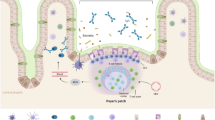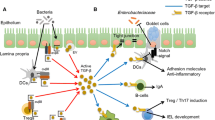Abstract
The effect of corticotropin-releasing factor (CRF) on gastrointestinal tract inflammation via modulation of the immune system cells such as dendritic cells (DCs) is not known. We investigated the expression of CRF and its receptors CRFR1 and CRFR2 in a colonic DC model (JAWSII cells) in a pro-inflammatory and anti-inflammatory milieu. The mRNA expression of CRF and protein expression of CRFR1 and CRFR2 was assessed, and lipopolysaccharide (LPS) was used to induce the maturation of JAWSII cells. JAWSII cells were divided into four groups: control, CRF, LPS, and LPS + CRF. The levels of secreted cytokines IL-6, IL-4, TNF-α, and MIP-1α were determined, both in JAWSII cells and in the culture supernatant, by qRT-PCR and ELISA. The expression of CRFR1 and CRFR2 in JAWSII cells was accompanied by a low CRF expression. Compared with control group, CRF group did not affect the expression of interleukin-6 (IL-6), tumor necrosis factor-α (TNF-α), and MIP-1α, but LPS treatment significantly increased the expression of these cytokines, indicating maturation of JAWSII cells. CRF further augmented the production of IL-6, TNF-α, and MIP-1α in mature JAWSII cells, with no increase in TNF-α mRNA expression. However, the expression of anti-inflammatory factor IL-4 did not change after LPS treatment. CRF treatment decreased the expression of IL-4 in both mature and immature JAWSII cells. JAWSII cells produce low level of CRF and express CRFR1 and CRFR2 surface receptors. CRF promotes immune/inflammatory responses in mature JAWSII cells when induced by LPS treatment.





Similar content being viewed by others
References
Lovell RM, Ford AC. Global prevalence of and risk factors for irritable bowel syndrome: a meta-analysis. Clin Gastroenterol Hepatol. 2012;10(7):712–21.
Spiller R, Garsed K. Postinfectious irritable bowel syndrome. Gastroenterology. 2009;136(6):1979–88.
Chang L. The role of stress on physiologic responses and clinical symptoms in irritable bowel syndrome. Gastroenterology. 2011;140(3):761–5.
Long Y, Wang W, Wang H, et al. Characteristics of intestinal lamina propria dendritic cells in a mouse model of postinfectious irritable bowel syndrome. Gastroenterol Hepatol. 2012;27:935–44.
Li M, Zhang L, Lü B, et al. Abnormal dendritic cells mediated immune response in a rat model of visceral hypersensitivity. Zhonghua Yi Xue Za Zhi. 2013;93(36):2904–8.
Cruickshank SM, English NR, Felsburg PJ, et al. Characterization of colonic dendritic cells in normal and colitic mice. World J Gastroenterol. 2005;11:6338–47.
Hojo M, Ohkusa T, Tomeoku H, et al. Corticotropin-releasing factor secretion from dendritic cells stimulated by commensal bacteria. World J Gastroenterol. 2011;17(35):4017–22.
Koido S, Ohkusa T, Kan S, et al. Production of corticotropin-releasing factor and urocortin from human monocyte-derived dendritic cells is stimulated by commensal bacteria in intestine. World J Gastroenterol. 2014;20(39):14420–9.
Chrousos GP. The hypothalamic–pituitary–adrenal axis and immune-mediated inflammation. N Engl J Med. 1995;332:1351–62.
Hauger RL, Grigoriadis DE, Dallman MF, et al. Current status of the nomenclature for receptors for corticotropin-releasing factor and their ligands. Pharmacol Rev. 2003;55(1):21–6.
Bale TL, Vale WW. CRF and CRF receptors: role in stress responsivity and other behaviors. Annu Rev Pharmacol Toxicol. 2004;44:525–57.
O’Malley D, Quigley EM, Dinan TG, et al. Do interactions between stress and immune responses lead to symptom exacerbations in irritable bowel syndrome? Brain Behav Immun. 2011;25(7):1333–41.
Im E. Multi-facets of corticotropin-releasing factor in modulating inflammation and angiogenesis. J Neurogastroenterol Motil. 2015;21(1):25–32.
Kiank C, Taché Y, Larauche M. Stress-related modulation of inflammation in experimental models of bowel disease and post-infectious irritable bowel syndrome: role of corticotropin-releasing factor receptors. Brain Behav Immun. 2010;24(1):41–8.
Labus JS, Hubbard CS, Bueller J, et al. Impaired emotional learning and involvement of the corticotropin-releasing factor signaling system in patients with irritable bowel syndrome. Gastroenterology. 2013;145(6):1253–61.
Zheng PY, Feng BS, Oluwole C, et al. Psychological stress induces eosinophils to produce corticotrophin releasing hormone in the intestine. Gut. 2009;58(11):1473–9.
Zhou H, Lu B, Zhang L, et al. The effect of antagonizing corticotropin releasing factor receptor 1/activating corticotropin releasing factor receptor 2 on visceral sensitivity and colonic motility of irritable bowel syndrome rats. Chin J Dig. 2011;31(6):372–6.
Gay J, Kokkotou E, O’Brien M, et al. Corticotropin-releasing hormone deficiency is associated with reduced local inflammation in a mouse model of experimental colitis. Endocrinology. 2008;149(7):3403–9.
Agelaki S, Tsatsanis C, Gravanis A, et al. Corticotropin-releasing hormone augments proinflammatory cytokine production from macrophages in vitro and in lipopolysaccharide-induced endotoxin shock in mice. Infect Immun. 2002;70(11):6068–74.
Reis e Sousa C. Activation of dendritic cells: translating innate into adaptive immunity. Curr Opin Immunol. 2004;16(1):21–5.
Awasthi S, Cox RA. Transfection of murine dendritic cell line (JAWS II) by a nonviral transfection reagent. Biotechniques. 2003;35(3):600–4.
Perrin MH, Vale WW. Corticotropin releasing factor receptors and their ligand family. Ann N Y Acad Sci. 1999;885:312–28.
Lee HJ, Kwon YS, Park CO, et al. Corticotropin-releasing factor decreases IL-18 in the monocyte-derived dendritic cell. Exp Dermatol. 2009;18:199–204.
Ge Q, Palliser D, Eisen HN, et al. Homeostatic T cell proliferation in a T cell-dendritic cell coculture system. Proc Natl Acad Sci USA. 2002;99(5):2983–8.
Xavier RJ, Podolsky DK. Unravelling the pathogenesis of inflammatory bowel disease. Nature. 2007;448(7152):427–34.
Pichai MV, Ferguson LR. Potential prospects of nanomedicine for targeted therapeutics in inflammatory bowel diseases. World J Gastroenterol. 2012;18(23):2895–901.
Ekman AK, Fransson M, Rydberg C, et al. Nasal challenge with LPS stimulates the release of macrophage inflammatory protein 1alpha. Int Arch Allergy Immunol. 2009;149(2):154–60.
Rogy MA, Beinhauer BG, Reinisch W, et al. Transfer of interleukin-4 and interleukin-10 in patients with severe inflammatory bowel disease of the rectum. Hum Gene Ther. 2000;11(12):1731–41.
Acknowledgments
This study was supported by the Natural Science Foundation of Zhejiang province (No. LZ12H03001), Natural Science Foundation of China (No. 81400594), and Natural Science Foundation of China (No. 81470814).
Author information
Authors and Affiliations
Corresponding author
Rights and permissions
About this article
Cite this article
Hu, Y., Li, M., Lu, B. et al. Corticotropin-releasing factor augments LPS-induced immune/inflammatory responses in JAWSII cells. Immunol Res 64, 540–547 (2016). https://doi.org/10.1007/s12026-015-8740-3
Published:
Issue Date:
DOI: https://doi.org/10.1007/s12026-015-8740-3




